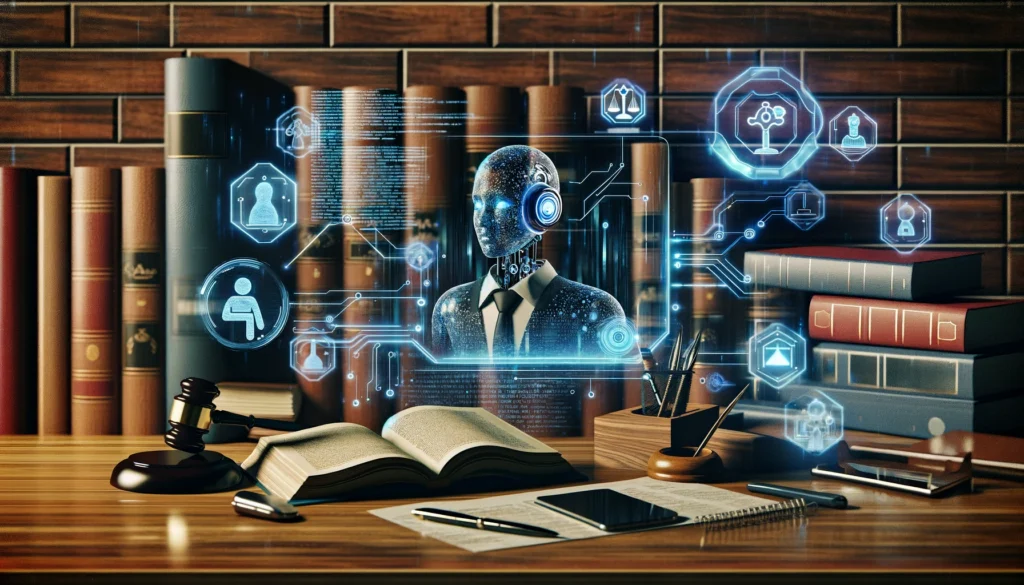
In the rapidly evolving landscape of legal practice, the integration of technology has become indispensable. For paralegals in estate planning, leveraging tools like ChatGPT and other large language models (LLMs) offers a promising pathway to enhancing efficiency and accuracy in preparing for client meetings. This article will guide you through a series of innovative strategies and detailed prompts designed to maximize the use of ChatGPT in your daily tasks, transforming how estate planning services are delivered.
The Role of AI in Legal Practice:
- Proactive Client Management: Using AI to ensure every client interaction is productive.
- Documentation Accuracy: Leveraging AI to enhance the accuracy of client documentation.
Understanding the basics of estate planning is crucial as we explore these AI tools. This foundational knowledge ensures the appropriate and effective use of technology, enhancing workflows rather than complicating them. As we progress, we will delve into preparing for initial client interviews using ChatGPT, ensuring you’re always one step ahead. This strategic approach not only streamlines processes but also boosts your capacity to handle complex client needs with greater precision.
In the following section, we’ll explore the essential concepts and documents involved in estate planning, setting the stage for a deeper dive into the technological tools that can facilitate these processes.
Understanding the Basics of Estate Planning
Before integrating ChatGPT into your estate planning procedures, it’s imperative to grasp the core elements that compose this area of law. A solid understanding ensures that any technological tool, such as an LLM, is used to its full potential, reinforcing rather than replacing the fundamental skills of legal practice.
Key Concepts in Estate Planning:
- Wills: Documents that specify the distribution of an individual’s assets post-mortem.
- Trusts: Arrangements where one party holds property for the benefit of another.
- Powers of Attorney: Authorizations to act on someone else’s behalf in legal or financial matters.
- Advance Directives: Instructions regarding healthcare, should one become unable to make decisions independently.
This basic knowledge is not just a prerequisite but a framework within which AI tools like ChatGPT operate. By understanding these documents and their purposes, paralegals can tailor their use of ChatGPT to create more accurate and client-specific documents.
Moving forward, the next section will demonstrate how to leverage ChatGPT for preparing initial client interviews. This includes using AI to simulate potential client questions and prepare responses, ensuring that you are well-prepared for any direction a client meeting might take. This preparatory step is crucial for maximizing the efficiency of client interactions and enhancing the overall quality of client service.
Leveraging ChatGPT for Initial Client Interview Preparation
Proper preparation is key to the success of any client meeting, especially in the nuanced field of estate planning. Utilizing ChatGPT to prepare for initial client interviews can streamline the process, ensuring that you’re equipped with the right questions and responses. Here’s how to make the most of this AI tool for client interactions.
Creating Effective Prompts with ChatGPT:
- Client Background Collection: Develop prompts to gather comprehensive information about the client’s family structure, financial situation, and existing estate plans. This foundational data is critical for tailoring advice and documents to each client’s unique circumstances.
- Scenario Simulation: Use ChatGPT to role-play various client scenarios. This can help you anticipate possible client questions and practice clear, concise, and legally sound responses.
Sample Prompts for ChatGPT:
- “Generate a list of introductory questions for a client with an international estate.”
- “Create a checklist of documents to request from a client considering setting up a trust.”
By simulating these interactions, you not only refine your approach but also build confidence in handling real-life situations. This preparation ensures that you are never caught off guard and can provide thoughtful, informed responses to client queries.
Next, we will delve into how ChatGPT can assist in organizing client documents—a task that, while administrative, is crucial for efficient case management. This section will introduce ways to utilize AI to categorize and manage documents effectively, setting the stage for a seamless document drafting process.
Using ChatGPT to Organize Client Documents
Effective document management is a cornerstone of successful estate planning. ChatGPT can significantly enhance this aspect of your work by helping organize and categorize client documents swiftly and accurately. This not only saves time but also ensures that no critical information is overlooked during the planning process.
Strategies for Document Organization with ChatGPT:
- Document Checklist Creation: Generate comprehensive lists of necessary documents for different types of estate plans using AI prompts. This ensures all pertinent paperwork is collected from the client.
- Document Sorting: Use ChatGPT to assist in sorting documents into categories such as wills, trusts, powers of attorney, and more. This can be done by creating prompts that classify documents based on their content or purpose.
Example Prompts for ChatGPT:
- “Compile a list of standard documents needed for a new estate planning client.”
- “Sort a batch of client documents into pre-defined categories based on keywords.”
Utilizing these AI-driven processes not only enhances efficiency but also minimizes the risk of human error in document handling. By ensuring that all necessary documents are correctly organized and accessible, paralegals can streamline the preparation process for drafting and reviewing estate planning documents.
As we progress to the next section, we’ll explore how ChatGPT can be further utilized to draft and review key estate planning documents. This involves not just generating text, but also ensuring that the documents meet legal standards and are tailored to each client’s specific needs. This step is vital for maintaining the high quality and accuracy required in legal document preparation.
Drafting and Reviewing Key Estate Planning Documents with ChatGPT
Drafting precise and legally compliant estate planning documents is a task that requires meticulous attention to detail. ChatGPT can be an invaluable asset in this phase, aiding paralegals in creating drafts and suggesting improvements to ensure the documents are not only comprehensive but also clear and legally sound.
Enhancing Document Drafting with ChatGPT:
- Template Generation: Use ChatGPT to create templates for common estate planning documents such as wills, trusts, and powers of attorney. This streamlines the drafting process by providing a consistent structure that can be customized for individual clients.
- Content Suggestion: Generate suggestions for clauses that are specific to the client’s situation, ensuring all legal nuances are addressed.
Example Prompts for ChatGPT:
- “Create a draft for a simple will for an unmarried client with no children.”
- “Suggest amendments to a trust agreement that includes provisions for a special needs child.”
By integrating these AI capabilities, paralegals can significantly reduce the time spent on initial drafts and revisions, allowing more focus on fine-tuning legal documents to better serve client needs.
Reviewing and Revising with AI:
- Error Detection: Employ ChatGPT to detect common errors in drafts, such as inconsistencies in names or terms, and suggest corrections.
- Legal Compliance Check: Use prompts to verify that the document complies with current state laws and legal standards.
Utilizing ChatGPT in these ways not only boosts productivity but also enhances the reliability of the documents produced. This application of technology ensures that paralegals can provide higher quality service to their clients and attorneys.
In the next section, we will turn our attention to how ChatGPT can be used to further enhance client communication. Effective communication is crucial in maintaining client trust and ensuring that all parties are well-informed throughout the estate planning process.
Enhancing Client Communication with ChatGPT
Effective communication is pivotal in maintaining transparency and trust with clients during the estate planning process. ChatGPT can greatly enhance how paralegals manage this crucial aspect by helping to draft clear, personalized, and professional communications.
Streamlining Communication with ChatGPT:
- Email Drafting: Use ChatGPT to draft email communications that are tailored to each client’s specific inquiries and updates. This ensures that the language is both professional and personalized, reflecting the client’s unique situation.
- Meeting Summaries: After client meetings, generate concise and accurate summaries using ChatGPT. These summaries can be shared with clients to confirm discussed points and agreed actions, reinforcing clarity and accountability.
Example Prompts for ChatGPT:
- “Generate a follow-up email for a client after an initial consultation regarding their estate plan.”
- “Create a summary of today’s meeting points to send to a client regarding changes in their trust agreement.”
By leveraging AI to assist in these tasks, paralegals can ensure consistency in client communications and reduce the time spent on routine correspondence. This allows more time to be dedicated to client service and complex legal tasks, ultimately enhancing the client experience.
Improving Client Engagement:
- FAQ Creation: Develop comprehensive FAQ documents tailored to common client questions about estate planning. This proactive approach keeps clients informed and can reduce the frequency of basic inquiry calls and emails.
As we continue to explore the capabilities of ChatGPT in the realm of estate planning, it becomes clear that these tools not only optimize the operational aspects of legal work but also elevate the quality of client interaction. In the subsequent section, we will discuss the importance of continual learning and updates in using AI tools like ChatGPT, ensuring that paralegals and the technologies they use remain at the forefront of legal practice developments. This ongoing education is crucial for maintaining effectiveness and compliance in a dynamically changing legal environment.
Continual Learning and Update
Staying current with the latest developments in estate planning law and technology is essential for maintaining the effectiveness of any legal practice. For paralegals utilizing tools like ChatGPT, continuous learning ensures that both the human and AI components of your toolkit are updated and aligned with current standards and best practices.
Strategies for Keeping Updated:
- Regular Training: Engage in regular training sessions or webinars that focus on recent legal changes and advancements in AI technology. This helps keep your skills sharp and your knowledge base expansive.
- Feedback Loops: Implement feedback loops where you routinely assess the effectiveness of the AI tools you use, including ChatGPT. Feedback from real-world use cases can guide you in refining prompts and adjusting strategies to better meet client needs.
Example Activities for Continuous Improvement:
- “Participate in a monthly webinar on the latest in estate planning legislation.”
- “Review and revise ChatGPT prompts quarterly based on recent case studies or legal updates.”
By committing to continual learning, you not only ensure that your legal practices remain compliant and effective but also harness the full potential of AI to enhance your productivity and service quality.
Integrating Updates:
- AI Model Training: Regularly update the AI models with the latest legal terminologies and case law to ensure the advice and documents generated are accurate and current.
- Legal Database Integration: Sync ChatGPT with up-to-date legal databases to pull in the most recent legal precedents and apply them in document drafting and client advisories.
The integration of these learning and updating practices is critical for staying ahead in a competitive field. Next, we will explore ethical considerations and best practices in using AI like ChatGPT in legal settings, ensuring that your use of technology adheres to the highest professional standards and respects client confidentiality. This foundational integrity is key to building trust and upholding the reputation of your practice.
Ethical Considerations and Best Practices
As paralegals integrate ChatGPT and other AI technologies into their daily workflows, it’s crucial to navigate the ethical landscape carefully. Maintaining high ethical standards not only protects clients but also enhances the credibility and trustworthiness of the legal practice.
Key Ethical Considerations:
- Client Confidentiality: Ensure that all interactions involving AI, such as ChatGPT, strictly adhere to confidentiality agreements. AI tools must be configured to not store or misuse client data.
- Accuracy of Information: While AI can generate documents and communications, it’s vital to verify the accuracy of this information. Paralegals must review AI-generated content for legal correctness and relevance before it reaches the client.
Best Practices for Using AI in Legal Work:
- Supervised Use: Always use AI tools like ChatGPT under supervision. Never rely solely on AI for legal advice or final document preparation without human oversight.
- Transparency with Clients: Be transparent with clients about the use of AI in your processes. This includes explaining how AI enhances the service they receive and ensuring they understand the role of technology in their case management.
Implementing Best Practices:
- “Establish regular check-ins to review AI-generated outputs for compliance with legal standards.”
- “Create a client consent form that includes information on AI tool usage in their case processing.”
By adhering to these ethical guidelines and best practices, paralegals not only safeguard their clients’ interests but also leverage AI responsibly, enhancing the efficiency and effectiveness of their legal work.
“Unlocking New Efficiencies” – Conclusion
In this journey through the innovative use of ChatGPT and other large language models in estate planning, we’ve seen how AI can dramatically transform traditional paralegal tasks, from document management to client communications. The adoption of these technologies allows paralegals to work more efficiently, focusing their skills on nuanced legal analysis and personalized client interaction rather than routine paperwork.
Summarizing the Benefits of AI in Legal Work:
- Enhanced Efficiency: AI tools speed up document drafting, client communication, and data organization, allowing paralegals to handle more cases with greater precision.
- Improved Accuracy: With AI’s capability to check for inconsistencies and legal updates, the accuracy of documents and communications is significantly improved, reducing the risk of human error.
- Personalized Client Service: AI’s ability to generate tailored communications and documents means clients receive more personalized and responsive service.
As estate planning continues to evolve with advancements in technology, the role of paralegals is also transforming. Embracing AI tools like ChatGPT not only enhances productivity but also enriches the quality of service provided to clients. This shift towards technology-driven legal services is not just about keeping pace with changes but about leading the charge, setting new standards for efficiency and effectiveness in the legal field.
Looking Forward:
- Continued Innovation: Paralegals should remain open to adopting new technologies that can further streamline their workflows.
- Ethical Vigilance: As AI becomes a staple in legal practices, maintaining ethical vigilance is crucial. It’s imperative to stay informed about the latest guidelines and best practices for using AI in legal settings.
By strategically integrating AI into their daily practices, paralegals can unlock new efficiencies, enhance their role within legal teams, and provide superior service to their clients. The future of legal practice will increasingly rely on the innovative use of technology, and paralegals who are adept at leveraging these tools will lead the way in redefining the capabilities of the legal profession.


